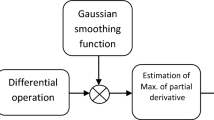Abstract
Because iris recognition uses the unique patterns of the human iris, it is essential to acquire the iris images at high quality for accurate recognition. Defocusing reduces the quality of the iris image and the performance of iris recognition, consequently. In order to acquire a focused iris image at high quality, an iris recognition camera must control the focal length of the moving lens. However, that causes the cost and size of iris camera to be increased and that needs complicated auto-focusing algorithm, also. To overcome such problems, we propose new method of iris image restoration. Experimental results show that the total recognition time is reduced as much as 390ms on average with the proposed restoration algorithm.
Preview
Unable to display preview. Download preview PDF.
Similar content being viewed by others
References
Daugman, J.G.: High confidence visual recognition of personals by a test of statistical independence. IEEE Trans. Pattern Anal. Machine Intell. 15(11), 1148–1160 (1993)
Jain, A.K.: Biometrics: Personal Identification in Networked Society. Kluwer Academic Publishers, Dordrecht (1998)
Daugman, J.G.: How Iris Recognition Works. IEEE Trans. on Circuits and Systems for Video Technology 14(1), 21–30 (2004)
van der Gracht, J., Pauca, V.P., Setty, H., Narayanswamy, R., Plemmons, R.J., Prasad, S., Torgersen, T.: Iris recognition with enhanced depth-of-field image acquisition. In: Proceedings of SPIE, vol. 5438, pp. 120–129 (2004)
Lee, J.-H., Kim, K.-S., Nam, B.-D., Lee, J.-C., Kwon, Y.-M., Kim, H.G.: Implementation of a passive automatic focusing algorithm for digital still carmera. IEEE Transactions on Consumer Electronics 41(3), 449–454 (1995)
Javis, R.A.: Focus Optimization Criteria for Computer Image Processing. Microscope 24(2), 163–180
Nayar, S.K., Nakagawa, Y.: Shape from Focus. IEEE Transactions on Pattern Analysis and Machine Intelligence 16(8), 824–831 (1994)
Choi, K.-S., Lee, J.-S., Ko, S.-J.: New Auto-focusing Technique Using the Frequency Selective Weight Median Filter for Video Cameras. IEEE Trans. on Consumer Electronics 45(3), 820–827 (1999)
Tenenbaum, J.M.: Accommodation in computer vision, Ph. D. thesis, Stanford University (1970)
Haruki, T., Kikuchi, K.: Video Camera System Using Fuzzy Logic. IEEE Transactions on Consumer Electronics 38(3), 624–634 (1992)
Ooi, K., Izumi, K., Nozaki, M., Takeda, I.: An Advanced Auto-focusing System for Video Camera Using Quasi Condition Reasoning. IEEE Transactions on Consumer Electronics 36(3), 526–529 (1990)
Hanma, K., Masuda, M., Nabeyama, H., Saito, Y.: Novel Technologies for Automatic Focusing and White Balancing of Solid State Color Video Camera. IEEE Transactions on Consumer Electronics CE-29(3), 376–381 (1983)
Gonzalez, R.C., Woods, R.E.: Digital Image Processing, 2nd edn. Prentice-Hall, Englewood Cliffs (2002)
Kundur, D., Hatzinakos, D.: Blind image deconvolution. IEEE Signal Processing Magazine 13, 43–64 (1996)
Savakis, A.E.: Blur Identification by Residual Spectral Matching. IEEE Transactions on Image Processing 2(2), 141–151 (1993)
http://www.panasonic.com/business/security/biometrics_data.asp
Author information
Authors and Affiliations
Editor information
Editors and Affiliations
Rights and permissions
Copyright information
© 2005 Springer-Verlag Berlin Heidelberg
About this paper
Cite this paper
Kang, B.J., Park, K.R. (2005). A Study on Iris Image Restoration. In: Kanade, T., Jain, A., Ratha, N.K. (eds) Audio- and Video-Based Biometric Person Authentication. AVBPA 2005. Lecture Notes in Computer Science, vol 3546. Springer, Berlin, Heidelberg. https://doi.org/10.1007/11527923_4
Download citation
DOI: https://doi.org/10.1007/11527923_4
Publisher Name: Springer, Berlin, Heidelberg
Print ISBN: 978-3-540-27887-0
Online ISBN: 978-3-540-31638-1
eBook Packages: Computer ScienceComputer Science (R0)




